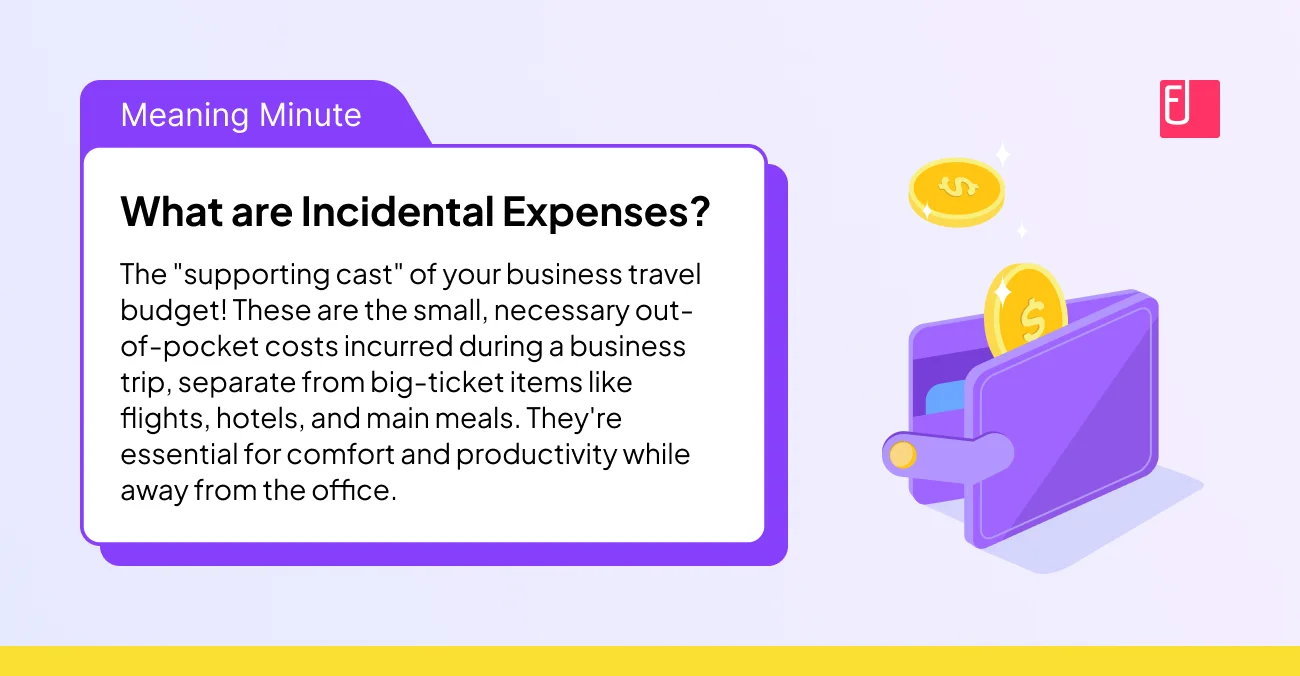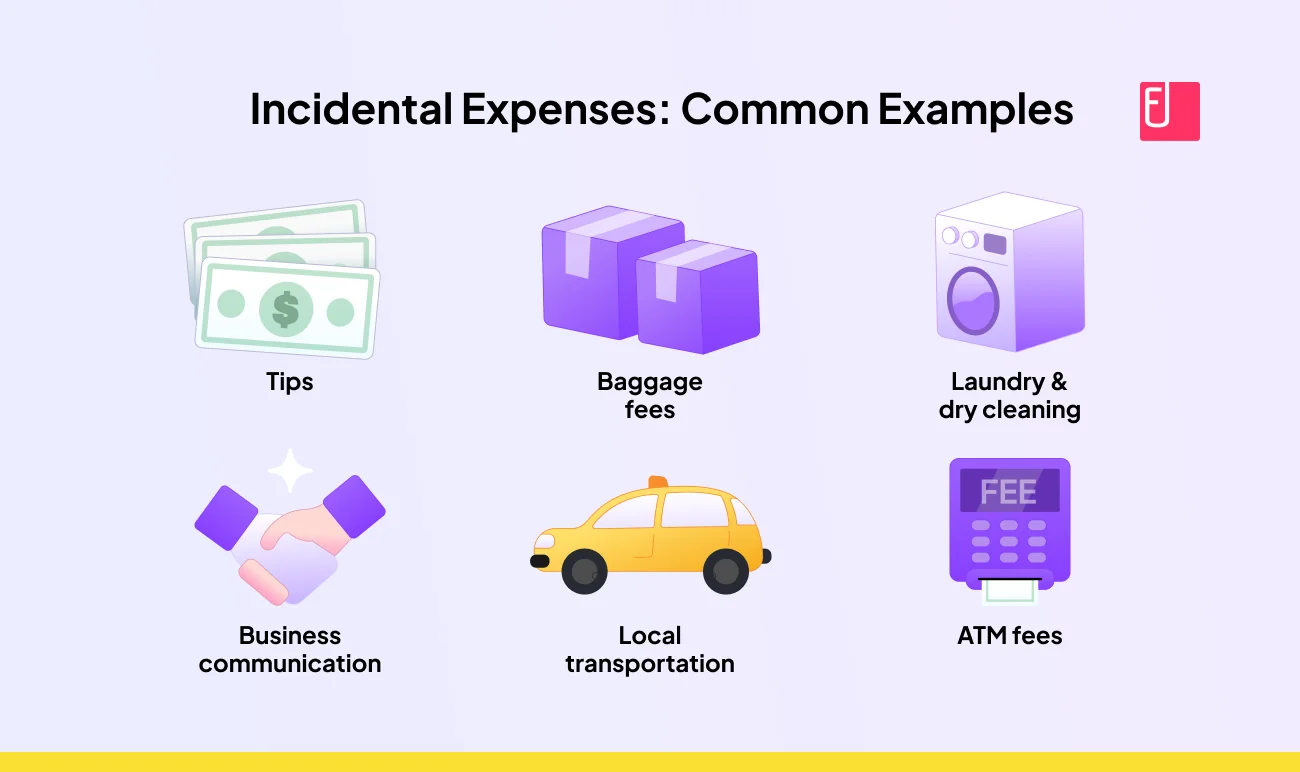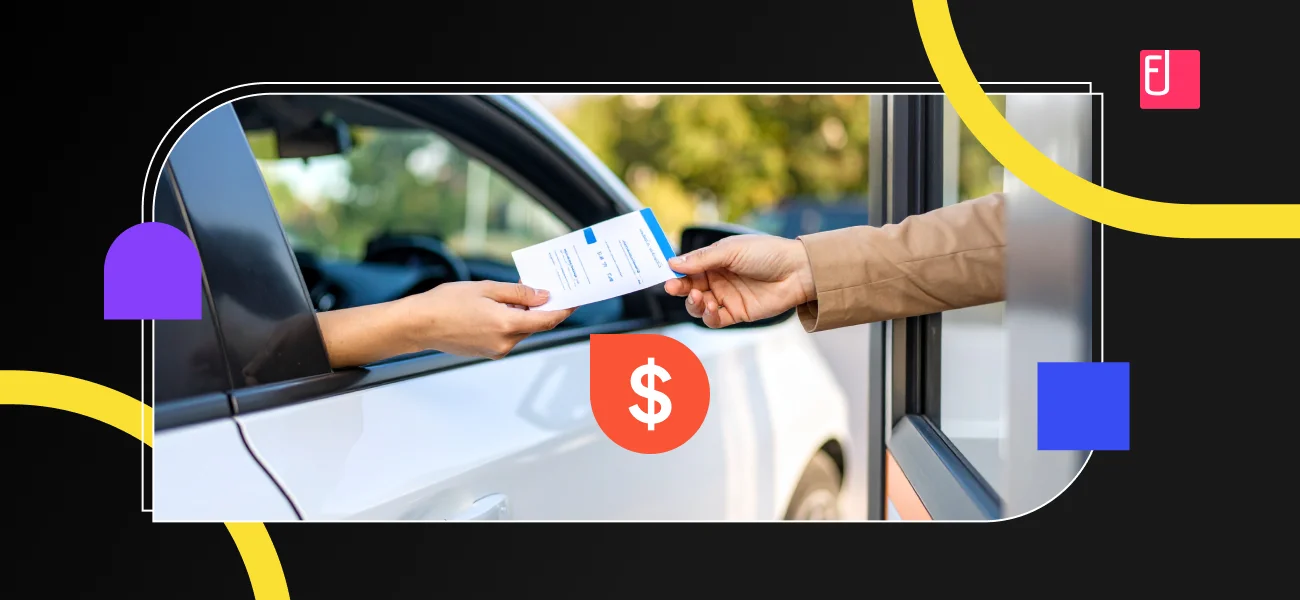Ever found yourself scratching your head over a tiny tip, a parking fee, or a quick laundry bill from a business trip? These seemingly insignificant charges are what we call incidental expenses. Individually, they might seem negligible. Collectively, however, they can morph into a significant financial drain and a compliance nightmare for businesses.
For financial controllers, these small expenses often trigger outsized headaches. They're notoriously hard to track, easily overlooked by employees, and frequently lead to the dreaded "receipt chase" that consumes valuable time and resources. This administrative burden isn't just annoying; it directly impacts real-time financial visibility.
But fear not. Understanding and proactively managing incidental expenses is simpler than you think. This guide will demystify these elusive costs, break down the crucial IRS rules, and equip you with smart management tips to turn a common headache into a seamless operation.
What are Incidental Expenses?

Incidental expenses are specific, minor out-of-pocket costs incurred by an individual during business travel that are distinct from major expenses like lodging and meals. Think of them as the supporting cast of your travel budget – small, but essential for the comfort, productivity, and smooth conduct of business while an employee is away from their regular workplace.
Incidental Expenses vs Other Travel Expenses
It's crucial to distinguish incidental expenses from other, larger components of business travel. Travel expenses broadly encompass all costs associated with being away from your tax home for business, including:
- Transportation: Flights, trains, car rentals.
- Lodging: Hotel stays.
- Meals: Food and beverages consumed.
- Incidental Expenses: The smaller, miscellaneous costs we're focusing on.
While incidental expenses are a component of overall travel expenses, they are typically the smallest and most numerous, often requiring a different approach to tracking due to their low individual value.
What the IRS Includes and Excludes in Incidental Expenses?
Here's where it gets specific, especially for tax purposes. The IRS has a very narrow definition of "incidental expenses" when it comes to per diem allowances:
IRS Definition of Incidental Expenses (for per diem purposes)
According to IRS Publication 463, "incidental expenses" specifically refer to fees and tips paid to porters, baggage carriers, hotel staff, and crew members on ships. This definition is quite limited, primarily covering services related to luggage and accommodation.
What the IRS Excludes from Incidental Expenses (but may be deductible elsewhere)
It's vital to understand that for per diem purposes, the IRS explicitly states that incidental expenses don't include:
- Expenses for laundry, cleaning, and pressing of clothing.
- Lodging taxes.
- Costs of telegrams or telephone calls.
- Transportation between places of lodging or business and places where meals are taken.
- The mailing cost of filing travel vouchers and paying employer-sponsored charge card billings.
While these items are excluded from the incidental expense per diem category, they may still be deductible as separate business travel expenses if they meet the IRS's "ordinary and necessary" criteria and are properly substantiated.
Examples of Incidental Expenses

- Tips: This is the most classic incidental expense. Think tips for hotel housekeeping, bellhops handling luggage, porters at airports or train stations, or even a small gratuity for a taxi or rideshare driver if not included in the fare.
- Baggage fees: Charges for checked luggage on flights, or even tips specifically for baggage handling services.
- Laundry & dry cleaning: Essential for maintaining a professional appearance during extended business trips. While not "incidental" by the strict IRS per diem definition, these are common small travel costs.
- Business communication: Costs for essential phone calls, faxes, or internet access fees incurred while traveling to conduct business.
- Local transportation at destination: Small fares for local taxis, public transit, or rideshares used to get between the hotel and business meeting locations, separate from the primary travel to the destination city.
- ATM fees: Charges incurred for withdrawing cash specifically needed for small business expenses during travel.
Also Read
Often Overlooked Incidental Expenses
These are the tiny costs that often slip through the cracks but can accumulate:
- Small tips for various service staff that might not be associated with a larger bill.
- Minor office supplies (e.g., pens, notebooks) purchased on the go for an unexpected business need.
- Small charges for hotel gym access or other amenities if directly related to maintaining well-being for business continuity.
- Small convenience store purchases (e.g., bottled water, a snack) directly related to maintaining focus or energy for business activities.
IRS Rules Around Incidental Expenses
Navigating the tax landscape for incidental expenses requires precision. Understanding the IRS's specific stance is vital for ensuring deductibility and avoiding audit issues.
Are Incidental Expenses Deductible According to the IRS?
Yes, incidental expenses are generally deductible. To qualify, they must be ordinary and necessary business expenses incurred while you are traveling away from your tax home for business purposes. Like all business expenses, they must also not be considered lavish or extravagant.
IRS Guidelines on Substantiating Incidental Expenses
The IRS places the "burden of proof" on the taxpayer to substantiate all deductions. For travel expenses, including incidental expenses, this means you must provide adequate records or sufficient evidence to prove certain elements.

The "De Minimis" Threshold for Receipts
A critical rule simplifies documentation for many incidental expenses: documentary evidence (such as receipts) is not strictly required for individual expenses (except for lodging) that are less than $75. This means many small incidental costs won't require a physical receipt.
What Documentation Does the IRS Require for Incidental Expenses?
- For expenses under $75 (non-lodging): While a receipt isn't mandatory, you still need to record the amount, time, place, and business purpose of the expenditure. A detailed log entry or an expense report entry noting these elements is crucial.
- For expenses of $75 or more (non-lodging): You must have documentary evidence. This includes a receipt, paid bill, or similar evidence that clearly shows the amount, date, place, and essential character of the expenditure.
- Importance of "Timely Kept Records": The IRS strongly emphasizes that records should be prepared or maintained "at or near the time of the expenditure" for increased reliability and accuracy. This means logging expenses as they happen, not weeks later.

How Should I Pay for Incidental Expenses During Business Travel?
The method an employee uses to pay for incidental expenses can significantly impact the ease of tracking, substantiation, and ultimately, reimbursement for the business.
Cash
- Pros: Convenient for very small, quick transactions, especially in places where cards aren't accepted (e.g., some small tips).
- Cons: No inherent digital record. Employees must manually remember to get and retain paper receipts (which are easily lost) or meticulously log every detail. This is a primary contributor to the "lost receipts" challenge and the "receipt chase" for finance teams.
Personal or Corporate Credit Card
- Pros: Automatically creates a digital record of the transaction (including amount, date, and merchant) on the statement. Corporate cards provide businesses with better control and visibility over their spending.
- Cons: Still requires employees to capture the itemized receipt (if over $75 or for lodging) to verify the nature of the purchase. This can still lead to missed receipts and the ongoing "receipt chase" if not managed efficiently.
Per Diem Allowance
- Pros: Immensely simplifies accounting and employee burden. If an employer provides an IRS-compliant per diem allowance that includes M&IE (Meals and Incidental Expenses), employees are generally not required to keep receipts for incidental expenses (or meals) up to the federal rate. They only need to substantiate the time, place, and business purpose of their travel.
- Cons: The fixed allowance may not perfectly align with actual spending (could be over or under). It provides less granular data for internal financial analysis of specific incidental costs if not supplemented with other tracking methods.
Can Incidental Expenses Be Reimbursed Without Receipts?
Yes, under specific conditions, incidental expenses can be reimbursed without individual receipts for IRS substantiation purposes:
- For individual expenses under $75 (non-lodging): The IRS does not require a physical receipt for incidental expenses (or other non-lodging expenses) that are individually less than $75. However, the employee must still record the amount, time, place, and business purpose of the expense.
- Through an IRS-compliant Per Diem allowance: If an employer provides an IRS-approved per diem allowance that covers Meals and Incidental Expenses (M&IE), the portion attributed to incidental expenses can be reimbursed without individual receipts. In this scenario, the employee only needs to adequately account for the travel's time, place, and business purpose.
Also Read
Challenges in Incidental Expense Management
Despite their small size, incidental expenses can create disproportionately large management headaches for businesses, leading to significant hidden costs and frustrations. Financial controllers are all too familiar with these pain points:
- Lost or missing receipts: The most common culprit. Employees often overlook small receipts, deem them unimportant, or simply lose them. This is a primary driver of the dreaded "receipt chase" for finance teams, consuming valuable time and resources.
- Late submissions and delays: Since individual incidental expenses are typically small, employees often procrastinate submitting them, waiting until the end of the month. This delay can ripple through the entire expense reporting process, contributing to delayed month-end closes and hindering timely financial reporting.
- Policy compliance and misuse: Without clear guidelines and robust tracking, even small amounts can lead to frequent, low-value policy violations. These seemingly minor infractions can accumulate into significant unauthorized spend and erode overall financial discipline.
- Lack of visibility and tracking issues: Aggregating and making sense of numerous small, diverse incidental expenses from various employees across different trips is a manual nightmare. This leads to poor visibility into this specific category of spending, making it difficult to analyze trends, identify cost-saving opportunities, or accurately allocate project costs.
- The "nuisance factor" & employee frustration: For employees, meticulously tracking and reporting many small, fiddly, incidental expenses can be a disproportionate nuisance. This administrative burden often leads to frustration, delayed submissions, or even employees simply not claiming legitimate expenses, which impacts morale and potentially leads to under-reported business costs.
Tips to Better Manage Business Incidental Expenses
Proactive strategies can transform incidental expense management from a burden into a smooth, efficient process.
- Establish clear policies and spending limits: Define precisely what qualifies as an incidental expense within your company. Set reasonable daily or per-trip spending limits for these categories, and clearly communicate the documentation requirements (e.g., what details are needed, even without a receipt, for expenses under $75).
- Provide simple tools for employees to track and report expenses: Ditch manual spreadsheets. Equip your employees with easy-to-use digital tools for instant expense capture, even for small amounts. The easier the tool, the higher the compliance.
- Ensure prompt and easy reimbursement processes: Rapid reimbursement for all legitimate expenses, including incidentals, motivates employees to submit reports accurately and on time, thereby boosting morale and reducing administrative friction.
- Educate employees on incidental expense policy: Don't just publish the policy; actively educate employees on its importance, the definitions, and how to use the provided tools. Explain why tracking these small amounts matters for the business's financial health and compliance.
- Conduct regular audits and compliance checks: Periodically review expense reports to ensure adherence to policies and identify areas for improvement or potential misuse. This helps maintain financial discipline and catch issues early.
- Leverage per diem allowances strategically: For certain types of business travel, providing an IRS-approved per diem allowance for meals and incidental expenses (M&IE) can significantly simplify the tracking process for both employees and finance. This eliminates the need for individual receipts for these items up to the federal rate, reducing the "receipt chase".
How Sage Expense Management (Formerly Fyle) Can Help

Sage Expense Management's expense management platform is uniquely positioned to transform the challenges of incidental expenses into a seamless, compliant process.
By directly integrating with credit card networks, it provides real-time expense tracking, immediately notifying finance teams via text message of every incidental expense incurred on a corporate card. This powers automated receipt collection and reconciliation: employees simply reply to an instant text notification with a receipt photo, and its AI extracts data and automatically matches it, slashing the "receipt chase" for even these small, often-lost items and drastically reducing manual effort.
Beyond just collection, Sage Expense Management ensures all required data points are captured for compliance, centralizing expenses in a secure, unalterable digital record for constant audit-readiness. Its proactive policy engine flags violations on small incidental expenses as they're submitted, strengthening financial governance and boosting visibility and control for finance teams.
This streamlined workflow, from effortless submission (reducing the "nuisance factor" for employees) to simplified reimbursements, makes managing every business expense, big or small, efficient and compliant.




















